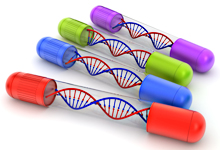Arthritis Genetics Analysis Aids Drug Discovery
Arthritis Genetics Analysis Aids Drug Discovery
An international research team identified 42 new areas in the human genome associated with rheumatoid arthritis—and found that many are already the targets of drugs approved for other conditions. The findings hint at new treatment approaches for the disease.
Rheumatoid arthritis is a chronic inflammatory disorder that can cause pain, swelling, stiffness, and loss of function in joints throughout the body. It’s an autoimmune disease, in which the immune system mistakenly attacks the body’s own tissue, such as the membranes that line the joints. It can also affect other parts of the body besides the joints.

The causes of rheumatoid arthritis aren’t completely known. Environmental factors—such as cigarette smoking, diet, and stress—may play a role in triggering the disease. Genetic factors are also thought to play a role. Several genes involved in the immune system have been associated with a tendency to develop rheumatoid arthritis.
An international team of researchers, led by Drs. Robert Plenge, formerly of Harvard Medical School, and Yukinori Okada from RIKEN Center for Integrative Medical Sciences in Japan, conducted a genome-wide association study (GWAS). This type of analysis involves scanning genetic regions in search of tiny variations that appear more often in people who have a particular condition than in those who don’t.
Scientists from 70 institutions worldwide were involved in the study, which was funded in part by NIH’s National Institute of Arthritis and Musculoskeletal and Skin Diseases (NIAMS) and National Institute of General Medical Sciences (NIGMS). Results appeared online in Nature on December 25, 2013.
The team analyzed 10 million gene variants from more than 100,000 people of European and Asian descent, including more than 29,000 people with rheumatoid arthritis and 73,000 controls. The researchers identified 42 new areas in the genome that are associated with rheumatoid arthritis, bringing the total number of known areas to 101. The findings suggest that the genetic risk of rheumatoid arthritis may be shared among Asians and Europeans.
Using bioinformatics methods, the scientists identified 98 candidate genes in these areas that might potentially contribute to the onset of rheumatoid arthritis. Further analysis showed a significant overlap among some of the gene regions and genes associated with other conditions, including human primary immunodeficiency and blood cancers.
The researchers analyzed drug databases and found that many of the genes associated with rheumatoid arthritis risk were the targets of drugs approved to treat people with the disease. They further found that risk genes overlapped with drugs approved for other diseases, suggesting these drugs might be repurposed for the treatment of rheumatoid arthritis.
“By leveraging human genetic data, we were able to shed light on genes and pathways that contribute to the onset of rheumatoid arthritis. In the future, this approach could be applied to a variety of other complex diseases to discover new pathways and biological insights for drug discovery,” Plenge says.
By Carol Torgan, Ph.D.
###
* The above story is reprinted from materials provided by National Institutes of Health (NIH)
** The National Institutes of Health (NIH) , a part of the U.S. Department of Health and Human Services, is the nation’s medical research agency—making important discoveries that improve health and save lives. The National Institutes of Health is made up of 27 different components called Institutes and Centers. Each has its own specific research agenda. All but three of these components receive their funding directly from Congress, and administrate their own budgets.


















